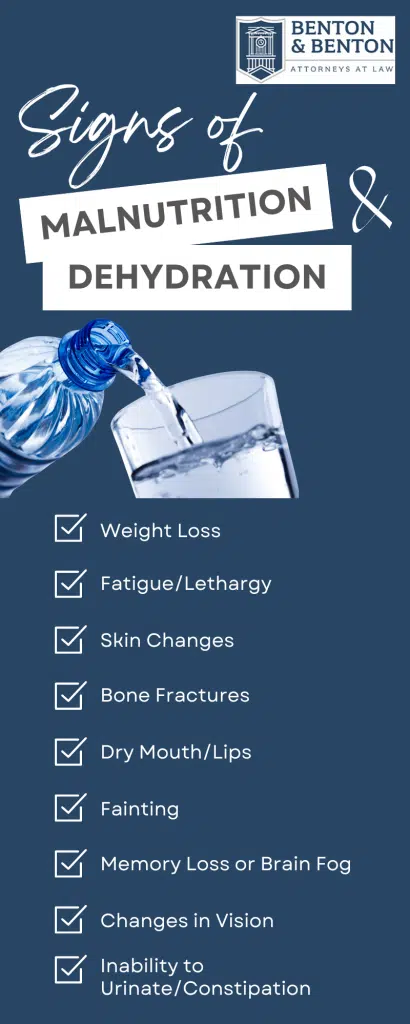Is Your Loved One at Risk?
As a concerned family member of an elderly nursing home resident, you entrust the well-being of your loved one to the nursing home or long-term care facility, expecting them to receive the highest standard of care. However, malnutrition and dehydration are alarming realities that many elderly individuals face in such environments. Recognizing the signs, understanding the consequences, and knowing when to act are crucial steps in safeguarding your loved one’s health and rights.
Understanding Malnutrition
Malnutrition, as defined by the Academy of Nutrition and Dietetics and ASPEN (American Society for Parenteral and Enteral Nutrition), is when the body does not receive adequate nutrients to maintain optimal health. This deficiency can result from a range of factors, including inadequate food intake, poor absorption of nutrients, or medical conditions affecting metabolism.
What Causes Malnutrition in Nursing Home Residents?
Malnutrition can stem from issues like insufficient staffing, neglect, or improper dietary management in long-term care facilities and nursing homes. The consequences are severe, ranging from weakened immune systems and muscle wasting to cognitive decline and increased vulnerability to infections.
Malnutrition is usually related to a lack of food or nutrients but it’s important to recognize that it’s often combined with certain diseases, social restrictions, and psychological issues.
Below are some examples of issues that may lead to malnutrition in Monroe nursing home residents:
- Dementia
- Alzheimer’s Disease
- HIV
- Liver problems
- Ulcerative Colitis
- Anorexia
- Certain medications
- Digestive issues
- Difficulty swallowing
- Autoimmune diseases
- Malabsorption of certain nutrients
- Dietary restrictions
- Difficulty swallowing
- Isolation
- Limited access to food
- Depression
- Dental issues
- Crohn’s disease
Signs of Malnutrition

Recognizing signs of malnutrition is essential for timely intervention. Look out for unexplained weight loss, fatigue, a weakened immune response, and changes in skin integrity or mental status.
Other signs may include:
- Anemia
- Lethargy
- Muscle atrophy
- Bone fractures
- Hair loss
- Bruising
- Kidney failure
- Heart failure
- Cystic fibrosis
- Rickets
- Memory loss or brain fog
- Agitation or irritability
- Changes in vision
- Depression
Prevention and Legal Action
Preventing malnutrition involves ensuring each resident receives adequate nutrition tailored to their individual needs, regular monitoring by healthcare professionals, and addressing any underlying health issues promptly. If you suspect malnutrition due to negligence or substandard care, contacting a qualified personal injury lawyer is crucial to protecting your loved one’s rights and holding responsible parties accountable.
Some things you can do to help include:
- Transparent communication with your loved one’s doctors, nurses, and caregivers.
- Encourage healthy eating habits by offering nutrient-rich foods like vegetables, peanut butter, whole grains, meats, and dairy products.
- Supplement nutrients as needed with vitamins or nutritional drinks.
- Encourage exercise. Even light walking can help stimulate appetite.
- Observe your loved one’s mealtimes.
- Regular dental checkups to address oral pain or other issues.
Understanding Dehydration
Dehydration occurs when the body loses more fluids than it takes in, leading to disruptions in essential bodily functions. In elderly individuals, dehydration can occur more rapidly due to age-related changes in thirst perception and kidney function. Nursing homes and other long-term care facilities are responsible for ensuring their residents are properly hydrated. Unfortunately, issues such as understaffing, poor care planning, and poorly trained staff can lead to residents not receiving enough fluids to stay properly hydrated.
Symptoms and Consequences of Dehydration
Symptoms of dehydration include dry mouth, sunken eyes, confusion, dark urine, and reduced urine output. Left untreated, dehydration can result in electrolyte imbalances, kidney failure, and even death.
Some other symptoms include:
- Dry mouth
- Chapped or cracked lips
- Dizziness
- Lethargy
- Headaches
- Vision problems
- Rapid heartbeat
- Dry skin
- Stomach cramps.
- Fainting
- An inability to urinate.
- Constipation
- Pressure injuries and other infections.
Dehydration is a common result of neglect or abuse, and it can lead to more serious issues. If unaddressed, eventually it may lead to comatose or death. Many nursing home residents are unable to express their needs for assorted reasons. They may be non-verbal or suffer from dementia or Alzheimer’s and are unaware of how long it has been since they have had anything to eat or drink. It is the facility’s responsibility to ensure each resident is properly cared for, including their food and liquid intake.
What Should Nursing Homes be Doing?
Caregivers should ensure adequate fluid intake, especially during hot weather or illness, and monitor each resident’s hydration status regularly. Dehydration, along with malnutrition, can signal underlying issues such as understaffing, inadequate training, or mismanagement within long-term care facilities, warranting further investigation and legal action if necessary. Below are some things caregivers and nursing home staff should be doing to ensure your loved one is receiving adequate fluids each day.
- Ongoing training for staff
- Monitoring fluid intake
- Ensuring residents always have water or other fluids within their reach.
- Encouraging frequent drinking
- Increasing fluid intake for those who aren’t getting the proper amount of fluids for their body weight.
- Incorporating foods high in water like fresh fruits and vegetables
- Monitoring residents’ urination frequency and color of urine
- Replenishing electrolytes when necessary
- Implementing Resident Assessment Protocol/MDS Assessment, which is a federally mandated process for clinical assessment of all residents who reside in a Medicare or Medicaid-certified facility.
Contact an Experienced Nursing Home Abuse Attorney
At Benton & Benton we understand the importance of protecting the rights and dignity of vulnerable individuals in nursing homes and long-term care facilities. If you suspect malnutrition, dehydration, or any form of neglect or abuse, don’t hesitate to reach out to us. Our compassionate and experienced lawyers are here to advocate for your loved one’s well-being and hold negligent parties accountable. Contact us today for a free confidential consultation.
You can call us at 866-927-4290 or fill out our contact form.
Remember, your loved one deserves the highest standard of care, and we’re here to ensure they receive it.

 Call Us Now
Call Us Now Email Us Now
Email Us Now


